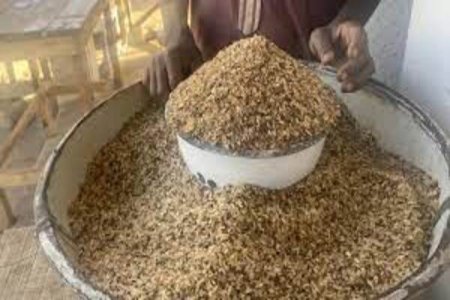
In the face of the unprecedented rise in living costs in northern Nigeria, a peculiar trend is emerging as many turn to rice grains known as 'afafata' - a term in the widely spoken Hausa language, meaning "battling." These grains, typically rejected by millers or sold to farmers for fish feed, have become a symbol of the struggle to put food on the table.
Isah Hamisu, a rice mill worker in Kano, explains, "A few years ago, people didn't care about this type of rice, and we usually threw it away along with the rice hulls, but times have changed." Despite their broken, dirty, and tough nature, the affordability of afafata has made it a lifeline for many poorer families grappling with the soaring prices of staple foods.
Fish farm owner Fatima Abdullahi notes that while her fish love afafata, its popularity among people has led to a spike in its price. This shift in consumption patterns comes at a time when Nigeria is experiencing its highest inflation rate in nearly 30 years, compounded by global pressures, the cancellation of the fuel subsidy, and the devaluation of the currency, the naira.
The cost of a standard 50kg bag of rice, crucial for feeding a household for about a month, has surged to 77,000 naira ($53; £41), marking a 70% increase since the middle of the previous year. This surpasses the monthly income of a majority of Nigerians, leading to cost-of-living protests in various states.
In response to the economic challenges, many families are turning to afafata, finding solace in its cheaper price. Hajiya Rabi Isah from Kano state emphasizes that without this type of rice, her children would go hungry, as the normal variety is beyond her means. Market sellers, like Saminu Uba in Kano's Medile market, report a booming business in afafata. "Most people can no longer afford normal rice, and they come for this, which is cheaper even though it tastes less good," says Uba.
Despite the challenges, the government claims to be addressing the situation by distributing grains like rice, millet, and maize.
However, some citizens remain skeptical, with one customer, Hashimu Dahiru, expressing the hardships faced: "Our wives spend hours removing stones and dirt from the rice before cooking, and even then it ends up tasting not nice, but we have to eat to survive."
As the struggle for affordable food continues, Nigeria grapples with the complexities of its economic policies, import restrictions, and the impact on the lives of its citizens. The unlikely rise of 'afafata' rice reflects the resilience of the people in the face of economic adversity.
Source: BBC


![[VIDEO] Mrs. Rita Lori Ogbebor Speaks Out Against Wike’s Land Revocation in Abuja](/data/attachments/211/211404-a400a2e81c27adeaef611b4d00f4dd0d.jpg?hash=s1cbV1GKAD)


